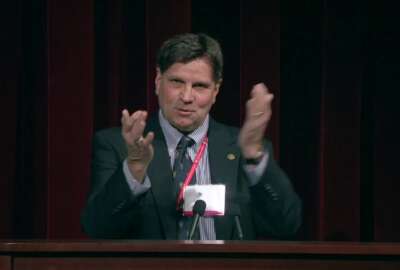

The Public Interest Declassification Board warns a backlog of records slated for declassification makes it harder for federal employees to telework if their jobs...
Best listening experience is on Chrome, Firefox or Safari. Subscribe to Federal Drive’s daily audio interviews on Apple Podcasts or PodcastOne.
For all the Trump administration’s plans to reorganize the federal government for efficiency’s sake, a longstanding request from the National Archives and Records Administration to shake up the way agencies declassify once-sensitive documents hasn’t gained much ground.
In its most recent reports to President Donald Trump, NARA’s Information Security Oversight Office has changed up its sales pitch.
Keeping a Cold War-era, analog declassification process in a digital world comes at a significant cost for the federal government — more than $18 billion to maintain in fiscal 2017.
The antiquated declassification process, the agency has argued, puts a bottleneck in the stream of information that should go out to the public, and not relieving that pressure increases the risk of staff going outside the process and leaking sensitive materials.
ISOO even tried to make its annual recommendations a breezier read, paring down what was once a 69-page report down to a dozen pages in 2018, without charts or graphs tracking the surge of documents agencies had to review for declassification in recent years.
But amid the coronavirus pandemic, Alissa Starzak, a member of the Public Interest Declassification Board led by ISOO, said the board has come up with a different value proposition: The backlog of agency records slated for declassification has made it harder for federal employees to telework if their jobs require them to work with sensitive information.
“You can’t work with classified information from home, so thinking about how you build systems where you actually have the maximum access to information possible, based on the circumstances that you’re in, is really important,” Starzak, also the head of public policy at the web security company CloudFlare, said in an interview.
Federal employees who routinely work with classified or top-secret information in the intelligence community have reported to work throughout the pandemic — in staggered shifts, in some cases. But Starzak said addressing over-classification increases the likelihood of workplace flexibility for certain staff.
“In a work-from-home environment, that actually has a remarkable amount of resonance for people, because you do want to make sure that people have access to information that they need to do their jobs, that there is some flexibility in how they connect with information,” she said. “To the extent that you can reduce the complexity of a system, make sure that you declassify more, that actually enables some additional flexibility in just working from home or working in a somewhat less secure environment.”
The declassification board’s report released Monday recommends that the Director of National Intelligence lead the effort to create a “consistent set of systems” that are interoperable between agencies in the declassification process.
“We need systems that talk to each other, we need systems that actually work across agencies, continually search and transfer information across agencies,” Starzak said. “We need to make sure that those who need access to classified information have access to systems that allow them to get there across agencies, and we need consistency in how we process data — understanding that every piece of classified data has certain metadata associated with it, what that looks like and making sure it’s consistent across different government agencies.”
The board has tapped ODNI to lead these efforts because of its work setting cloud storage requirements for the rest of the intelligence community. That cloud architecture, she added, serves as the foundation for IC employees to comb through electronic records faster using machine learning and data analysis tools.
“Our view on the board was that we really should be leveraging the technologies that are already out there to do a better job both at classification and declassification,” she said. “Our sense was really that technology is a benefit that we should be able to tap as a tool.”
The board also recommends that agencies include the federal acquisition community and vendors in setting up the interoperable systems needed to streamline the declassification process.
Starzak said the board didn’t necessarily call for a shared services solution, but said that was a decision for ODNI to make.
“We do recognize that you can’t have non-interoperable systems, and so to the extent that that becomes a shared services model, because that’s the best approach, that is certainly a good option,” she said.
While the declassification board has set long-term recommendations for agencies to declassify their records, it also suggests more immediate steps, such as the Defense and Energy Departments working with ODNI and NARA to come up with a strategy to modernize the systems that store classified records.
“These are longer-term vision ideas about what a reshuffling of the system looks like, because we really do have a view that this paradigm needs to change,” Starzak said. “But I think that the initial steps that agencies can take are actually relatively straightforward. Some of it is getting people together, getting people to have conversations about what can happen next. It’s thinking about appropriately funding different agencies, it’s the planning stage.”
Copyright © 2025 Federal News Network. All rights reserved. This website is not intended for users located within the European Economic Area.
Jory Heckman is a reporter at Federal News Network covering U.S. Postal Service, IRS, big data and technology issues.
Follow @jheckmanWFED



